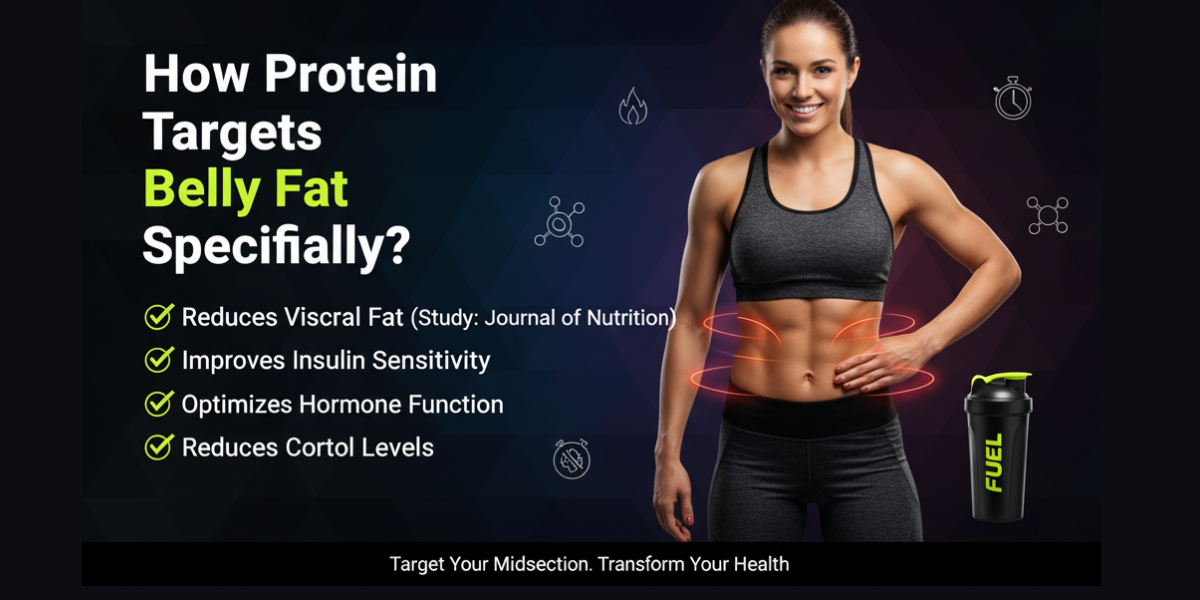

Protein stands as one of the most powerful nutrients for weight management and body composition improvement. Scientific research consistently demonstrates that adequate protein intake accelerates fat loss, preserves lean muscle mass, and specifically targets stubborn belly fat. Understanding how protein for weight loss strategies work can transform your approach to sustainable weight management and help you achieve lasting results.
The relationship between protein consumption and weight loss operates through multiple biological mechanisms that work together to create an optimal fat-burning environment in your body. These processes affect everything from your metabolic rate to your hunger hormones, making protein an essential component of any effective weight loss strategy.
The Science Behind Protein and Weight Loss
Protein for weight loss effectiveness stems from its unique impact on metabolism and energy expenditure. When you consume protein, your body burns significantly more calories during digestion compared to processing carbohydrates or fats. This process, called the thermic effect of food, can increase your metabolic rate by 15-30% for several hours after eating protein-rich meals.
Research published in the American Journal of Clinical Nutrition shows that people who increase their protein intake to 25-30% of total daily calories experience enhanced weight loss compared to those following lower-protein diets. The study participants lost more fat while preserving lean muscle mass, which is crucial for maintaining metabolic health during weight reduction.
Protein also regulates hunger hormones more effectively than other macronutrients. High-protein meals increase production of satiety hormones like GLP-1, peptide YY, and cholecystokinin while reducing levels of ghrelin, the hunger hormone. This hormonal response leads to natural appetite suppression and reduced caloric intake without conscious effort or willpower.
The muscle-preserving effects of adequate protein intake become particularly important during caloric restriction. When you lose weight, your body naturally breaks down both fat and muscle tissue. However, consuming sufficient protein signals your body to preferentially burn fat while maintaining lean muscle mass, which keeps your metabolism elevated throughout the weight loss process.
How Protein Targets Belly Fat Specifically?

Protein for losing belly fat works through targeted mechanisms that address visceral fat accumulation around the midsection. Visceral fat, the dangerous fat stored around internal organs, responds particularly well to increased protein consumption combined with caloric restriction.
Studies demonstrate that higher-protein diets lead to greater reductions in waist circumference and abdominal fat compared to lower-protein approaches. A landmark study in the Journal of Nutrition found that participants consuming 1.2-1.6 grams of protein per kilogram of body weight lost significantly more belly fat than those eating standard protein amounts.
Protein helps reduce belly fat by improving insulin sensitivity and glucose metabolism. When your body becomes more efficient at processing carbohydrates, it stores less energy as abdominal fat. The amino acids in protein also support the production of hormones that promote fat oxidation, particularly in the abdominal region.
The cortisol-reducing effects of protein consumption also contribute to belly fat reduction. Chronic stress and elevated cortisol levels promote fat storage around the midsection. Protein helps stabilize blood sugar levels and reduce stress-induced cortisol spikes, creating a hormonal environment that favour’s fat loss rather than fat storage.
Practical Protein Strategies for Maximum Results
Implementing effective protein for losing weight strategies requires understanding optimal timing, amounts, and sources. Research suggests that consuming 20-40 grams of high-quality protein at each meal provides the best results for weight loss and muscle preservation.
Starting your day with a protein-rich breakfast sets the tone for improved appetite control throughout the day. Studies show that people who eat high-protein breakfasts consume fewer calories at lunch and dinner without conscious effort. Eggs, Greek yogurt, protein smoothies, and lean meats provide excellent breakfast protein options.
Distributing protein intake evenly across meals maximizes its metabolic benefits. Rather than consuming most protein at dinner, spreading intake throughout the day maintains steady amino acid availability for muscle protein synthesis and metabolic processes.
Quality matters as much as quantity when selecting protein sources. Complete proteins containing all essential amino acids provide superior results for weight loss and body composition. Lean meats, fish, eggs, dairy products, and plant-based combinations like rice and beans offer comprehensive amino acid profiles.
Conclusion
The evidence overwhelmingly supports protein’s role as a cornerstone nutrient for effective weight loss and belly fat reduction. Protein for losing belly fat strategies work through multiple pathways, including increased metabolism, improved satiety, hormone optimization, and muscle preservation.
Successful implementation requires consistent daily protein intake of 1.2-2.0 grams per kilogram of body weight, distributed evenly across meals and combined with regular physical activity. The metabolic advantages of adequate protein consumption make weight loss more sustainable and help prevent the muscle loss that typically accompanies caloric restriction.
Ready to optimize your protein intake for maximum weight loss results? Visit Binabadan.com for comprehensive nutrition guides, meal plans, and expert advice on achieving your fitness goals through evidence-based strategies.
Related Products
-
DP SECRET WEAPON® CITRULLINE, 300 grams
RM236.00Original price was: RM236.00.RM99.63Current price is: RM99.63. -
DP Secret Weapon® EXPLODE Sachets
-
DP Secret Weapon® GLUTAMINE 300 Grams
RM169.63Original price was: RM169.63.RM89.63Current price is: RM89.63.
Share this post
Recent Posts

Newsletter
Popular Categories
Related Post
You May Like
Lorem ipsum dolor sit amet, consectetur adipiscing elit, sed do eiusmod tempor incididunt ut labore et dolore magna aliqua. Ut enim ad minim veniam, quis nostrud exercitation








